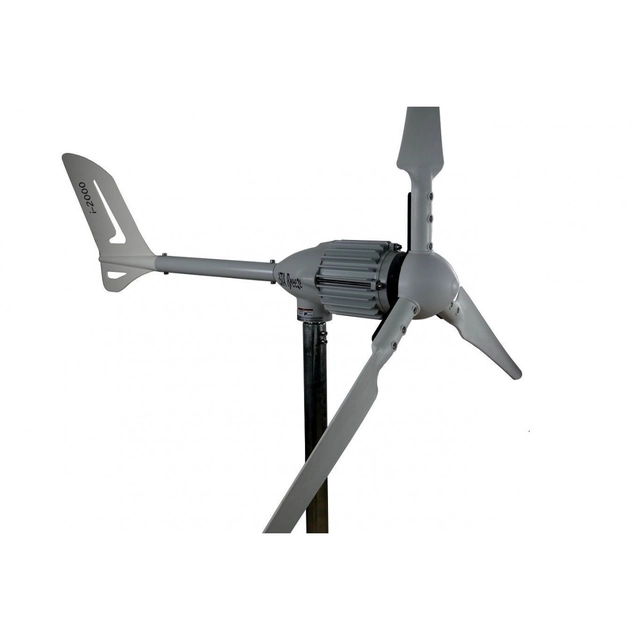
merXu Protected Payments
Turvaa maksusi toimitukseen asti.

PROMOTION Ista Breeze -tuuliturbiini i-2000 48V 2000W
Toimittajan tarjous:
Lähetysmaa:
Määränpäänä olevat maat:
Arvioitu toimituspäivä:
MerXun suosittelemat maksutavat:
Vaihtoehtoiset maksutavat:
MINI WIND TURBINE ISTA BREEZE 2000W
Micro wind power plant.Recommended for stationary solutions, mounted on the roof of buildings or on a mast.
It is a power plant with high efficiency considering the weight and size
NOTE: this turbine must be connected to a battery charging regulator or an on-grid / off-grid inverter.
The generator outputs 3-fazowy alternating current with a voltage of 48V.
Like any wind turbine, it should be installed as high as possible, away from obstacles.
Without notification and without permission, it may be mounted on an existing building on a mast up to a height of 3 meters above the highest element of the roof.
Installation must be solid.We also offer factory masts.
Real energy yields from wind are from 8m/s, i.e. approximately 30km/h.It must be a stable wind, without turbulence.Any obstacles, such as buildings, trees at a distance of up to 50m, cause turbulence that significantly reduces the wind energy.The best thing is an empty field on a hill.Finding good conditions for a turbine may not be easy.Of course, the higher the mast, the stronger the wind.
A wind turbine needs strong wind to produce a noticeable amount of energy.The power of the turbine depends on the cube of the air velocity.
Since a lot of misunderstandings have arisen with such turbines, here we show how power depends on wind speed and rotor diameter.
The theoretical power in the flowing fluid/air stream is:
P=0,5 * q * V3*S
Where: P-power, q - fluid density (air at temperature 20 degrees has 1,2kg/m3), V - fluid velocity in m/s, S flow cross-section in m2
The maximum efficiency of turbines with a horizontal axis of rotation is n=0,4.Real is 0,3 (i.e. 30% of wind energy can be converted into electricity)
Therefore, the electrical power of our turbine with a diameter of 2,2m and wind speed of 36km/h=10m/s
Flow cross section =3,14*(2,2/2)2=3,8m2
P=0,3*0,5*1,2*10*10*10*3,8=684W
For wind speed 15m/s
P=0,3*0,5*1,2*15*15*15*3,8=2308W
For wind speed 5m/s
P=0,3*0,5*1,2*5*5*5*3,8=85,5W
Assuming 24 wind hours 5m/s for 365 days we have energię:750kWh
NOTE: order processing time: up to 2 weeks.
Load curve settings for this turbine and inverter 48V
For voltages below 48V we set the minimum load around 1A
Voltage 50V, current 5A
Voltage 60V, current 7A
Voltage 70V, current 10A
Voltage 80V, current 15A
Voltage 90V, current 20A
Set "Dump load" to the voltage 95V (the voltage at which it starts dropping on the resistor)
Cut off /shutdown is set to voltage 105V (cut-off voltage of the inverter. The inverter cuts itself off at approximately 110V)
Instructional video on how to install the turbine and you have a charge regulator:
https://www.youtube.com/watch?v=0um1nZu_ETo
And here is the configuration with DEYE:
https://www.youtube.com/watch?v=tpG_Q2ops_o&t=142s
Micro wind power plant.Recommended for stationary solutions, mounted on the roof of buildings or on a mast.
It is a power plant with high efficiency considering the weight and size
NOTE: this turbine must be connected to a battery charging regulator or an on-grid / off-grid inverter.
The generator outputs 3-fazowy alternating current with a voltage of 48V.
Like any wind turbine, it should be installed as high as possible, away from obstacles.
Without notification and without permission, it may be mounted on an existing building on a mast up to a height of 3 meters above the highest element of the roof.
Installation must be solid.We also offer factory masts.
Real energy yields from wind are from 8m/s, i.e. approximately 30km/h.It must be a stable wind, without turbulence.Any obstacles, such as buildings, trees at a distance of up to 50m, cause turbulence that significantly reduces the wind energy.The best thing is an empty field on a hill.Finding good conditions for a turbine may not be easy.Of course, the higher the mast, the stronger the wind.
A wind turbine needs strong wind to produce a noticeable amount of energy.The power of the turbine depends on the cube of the air velocity.
Since a lot of misunderstandings have arisen with such turbines, here we show how power depends on wind speed and rotor diameter.
The theoretical power in the flowing fluid/air stream is:
P=0,5 * q * V3*S
Where: P-power, q - fluid density (air at temperature 20 degrees has 1,2kg/m3), V - fluid velocity in m/s, S flow cross-section in m2
The maximum efficiency of turbines with a horizontal axis of rotation is n=0,4.Real is 0,3 (i.e. 30% of wind energy can be converted into electricity)
Therefore, the electrical power of our turbine with a diameter of 2,2m and wind speed of 36km/h=10m/s
Flow cross section =3,14*(2,2/2)2=3,8m2
P=0,3*0,5*1,2*10*10*10*3,8=684W
For wind speed 15m/s
P=0,3*0,5*1,2*15*15*15*3,8=2308W
For wind speed 5m/s
P=0,3*0,5*1,2*5*5*5*3,8=85,5W
Assuming 24 wind hours 5m/s for 365 days we have energię:750kWh
NOTE: order processing time: up to 2 weeks.
Load curve settings for this turbine and inverter 48V
For voltages below 48V we set the minimum load around 1A
Voltage 50V, current 5A
Voltage 60V, current 7A
Voltage 70V, current 10A
Voltage 80V, current 15A
Voltage 90V, current 20A
Set "Dump load" to the voltage 95V (the voltage at which it starts dropping on the resistor)
Cut off /shutdown is set to voltage 105V (cut-off voltage of the inverter. The inverter cuts itself off at approximately 110V)
Instructional video on how to install the turbine and you have a charge regulator:
https://www.youtube.com/watch?v=0um1nZu_ETo
And here is the configuration with DEYE:
https://www.youtube.com/watch?v=tpG_Q2ops_o&t=142s